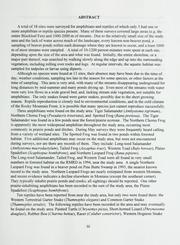Check nearby libraries
Buy this book

A total of 18 sites were surveyed for amphibian and reptiles of which only 5 had one or more amphibian or reptile species present. Many of these surveys covered large areas (e.g. the entire Blackleaf Fen) and 1000-2000 m of streams. Due to the relatively small size of the study area and the lack of water across much of the landscape, every known non-beaver pond, a sampling of beaver ponds within each drainage where they are known to occur, and a least 1000 m of most streams were sampled. A total of 20-1200 person minutes were spent at each site, depending upon the size of the areas and what was found. Initially, the entire shoreline, or a major part thereof, was searched by walking slowly along the edge and up into the surrounding vegetation, including rolling over rocks and logs. At regular intervals, the aquatic habitat was sampled for tadpoles or larvae using dipnets. Although no species were found at 13 sites, their absence may have been due to the time of day, weather conditions, sampling too late in the season for some species, or other factors at the time of sampling. The area is very arid, with many of the streams disappearing underground for long distances by mid-summer and many ponds drying up. Even most of the streams with water were very low flows in a wide gravel bed, and, lacking stream side vegetation, not suitable for amphibians. The only snakes found were grater snakes, possibly due to the sort growing season. Reptile reproduction is closely tied to environmental conditions, and in the cold climate of the Rocky Mountain Front, it is possible that many species just cannot reproduce successfully. Three amphibians were found on the study area: Tiger Salamander (Ambystoma tigrinum), Northern Chorus Frog (Pseudacris triseriata), and Spotted Frog (Rana pretiosa). The tiger Salamander was found in a few ponds near the forest/prairie ecotone. The Northern Chorus Frog is apparently the most widespread amphibian throughout the study area, occurring most commonly in prairie ponds and ditches. During May surveys there were frequently heard calling from a variety of wetland sites. The Spotted Frog was found in two ponds within forested habitat. Five additional amphibians may occur on the study area, but were not encountered during surveys, nor are they any records of them. They include: Long-toed Salamander (Ambystoma macrodactylum), Tailed Frog (Ascaphus truei), Western Toad (Bufo boreas), Plains Spadefoot (Scaphiopus bombifrons), and Northern Leopard Frog (Rana pipiens). The Long-toed Salamander, Tailed Frog, and Western Toad were all found in very small numbers in forested habitat on the RMRD in 1994, near the study area. A single Northern Leopard Frog was found in a beaver pond on Pine Butte Swamp in 1993, the nearest known record to the study area. Northern Leopard Frogs are nearly extirpated from western Montana, and recent evidence indicates a decline elsewhere in Montana (except the southeast corner). They typically inhabit prairie ponds and creeks; all sightings should be reported. One other prairie-inhabiting amphibian has been recorded to the east of the study area, the Plains Spadefoot (Scaphiopus bombifrons). Ten reptiles have been reported from near the study area, but only two were found there: the Western Terrestrial Garter Snake (Thamnophis elegans) and Common Garter Snake (Thamnophis sirtalis). The following reptiles have been recorded in the area and may eventually be found on the study area: Painted Turtle (Chrysemys picta), Short-horned Lizard (Phrynosoma douglasi), Rubber Boa (Charina bottae), Racer (Coluber constrictor), Western Hognose Snake (Heterodon nasicus), Gopher Snake (Pituophis catenifer), Plains Garter Snake (Thamnophis radix) and Western Rattlesnake (Crotalis viridis). I searched for suitable habitat for northern bog lemmings while traveling to and conducting reptile and amphibian surveys across the study area. The only site within the study area with even marginally suitable habitat was Blackleaf Swamp. Northern bog lemmings were not captured there, nor at nearby Pine Butte Swamp. At both sites however, 4-5 species of other small mammals were captured, including masked shrew (Sorex cinereus), montane shrew (Sorex monticolus), water shrew (Sorex palustris), meadow vole (Microtus pennsylvanicus), and deer mice (Peromyscus maniculatus). The habitat on the study area appears to be very limited for northern bog lemmings; the only suitable site seen was trapped. Trapping intensity was probably sufficient to detect lemmings had they been present; more surveys are not warranted at this time. Additionally, many meadow voles were capture at Blackleaf and bog lemmings have not been found at sites with high numbers of meadow voles also present at any Montana location (Reichel and Beckstrom 1993, 1994). It seems unlikely that bog lemmings are actually present, but went undetected at this site.
Check nearby libraries
Buy this book

Previews available in: English
| Edition | Availability |
|---|---|
|
1
Amphibian, reptile and northern bog lemming survey on the Rocky Mountain Front: 1996
1997, Montana Natural Heritage Program
in English
|
aaaa
|
Book Details
Edition Notes
The Physical Object
ID Numbers
Work Description
pv9Ftg tpjgcsqsiokv, [url=http://jbfiqgbgjjny.com/]jbfiqgbgjjny[/url], [link=http://gayaihiwbnan.com/]gayaihiwbnan[/link], http://fqmnccbpzkuw.com/
Community Reviews (0)
Feedback?| October 27, 2012 | Edited by 91.201.64.28 | pv9Ftg <a href="http://tpjgcsqsiokv.com/">tpjgcsqsiokv</a>, [url=http://jbfiqgbgjjny.com/]jbfiqgbgjjny[/url], [link=http://gayaihiwbnan.com/]gayaihiwbnan[/link], http://fqmnccbpzkuw.com/ |
| August 1, 2012 | Edited by ImportBot | import new book |
| April 28, 2010 | Edited by Open Library Bot | Linked existing covers to the work. |
| January 23, 2010 | Edited by WorkBot | add more information to works |
| December 11, 2009 | Created by WorkBot | add works page |









